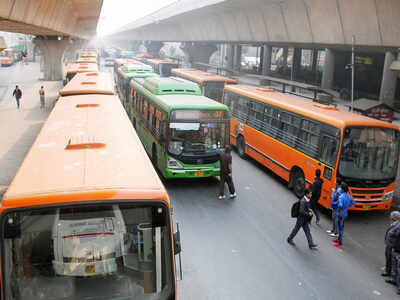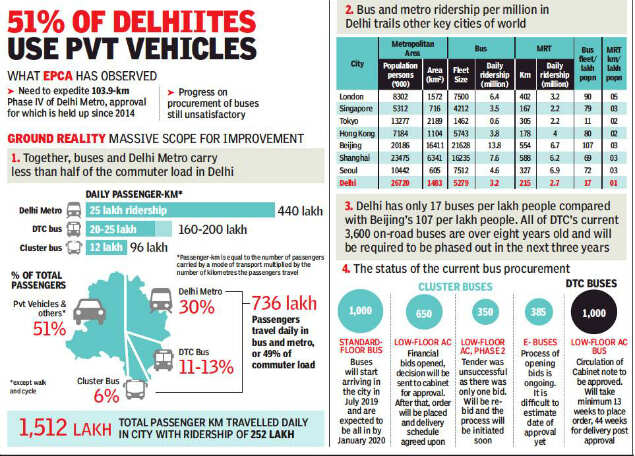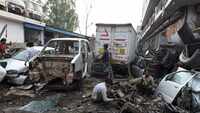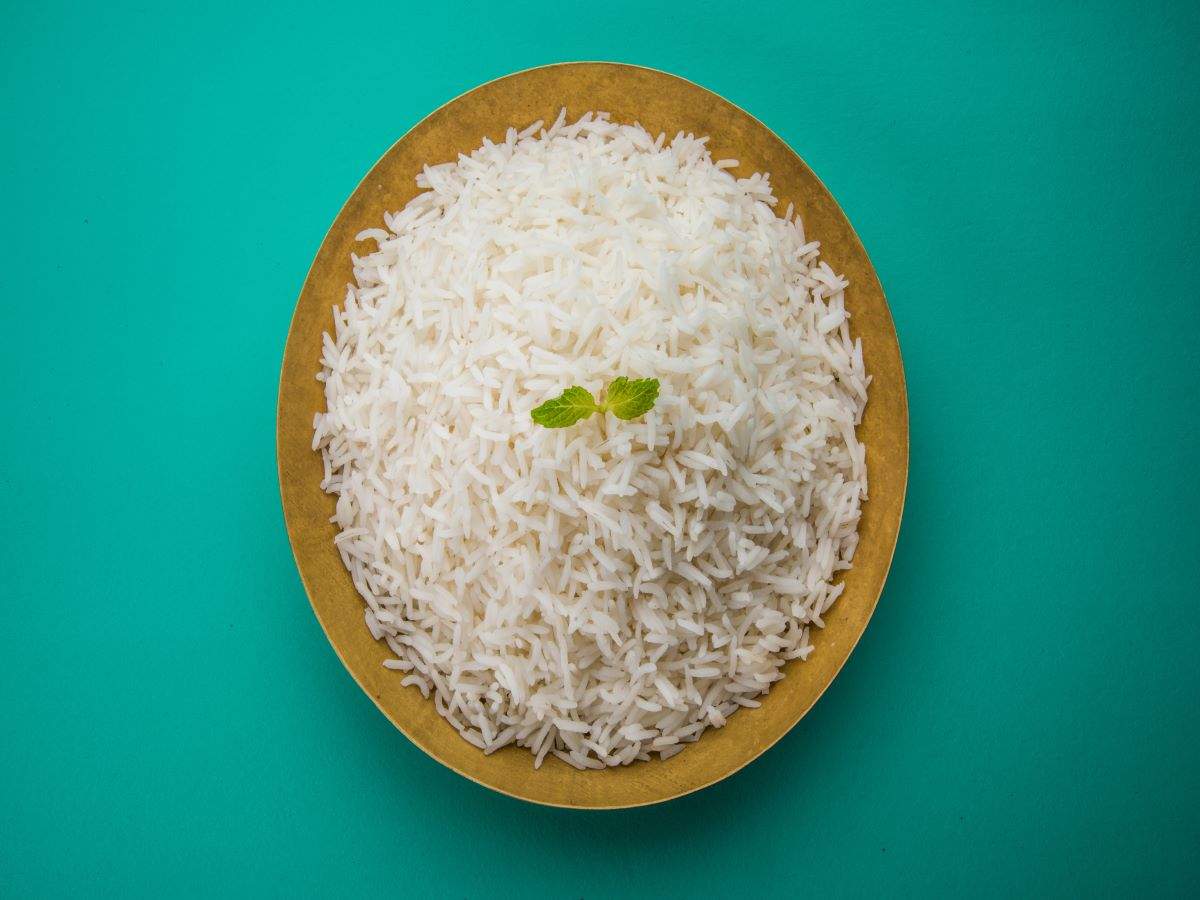
NEW DELHI: The Environment Pollution (Prevention and Control) Authority says that quick procurement of public transport buses and resolution of issues delaying the start of Phase IV of Delhi Metro will boost the transport infrastructure of the capital.

EPCA, a Supreme Court mandated body tasked with taking measures to tackle air pollution in the National Capital Region, recently presented a report to the apex court and sought its intervention in the matters related to both the Delhi Metro and public buses. EPCA assists the court in matters related to environment in the region. According to experts, it is not possible to reduce toxic air pollution in Delhi without reducing the rate of motorisation and this is only possible if there is a viable public transport system, which is modern, convenient, affordable and safe. This underscores the need to augment the capital’s public transport.
“Resolve the pending issues that are delaying the approval of Phase IV of Delhi Metro. Phase IV is critical as it will add another 104km to the network… and will densify it and make the system more viable and attractive to commuters,” the report, a copy of which is with TOI, said.
The report went on, “The Phase IV clearance is a matter of urgency and further delays will cost the city enormously. This proposal for this phase of metro was first submitted in 2014 and work was to begin by 2016. But there is a stalemate in the discussions between the Union government and Delhi government on different financial aspects of the project… The intervention of the Hon’ble Court is vital in resolving this much delayed project… It will take some time, after the go-ahead, for the project to start work on the ground.”
As for the approval for and induction of new buses in Delhi, the expert panel pointed out that no new buses had been added to the Delhi Transport Corporation (DTC) fleet in the last four years. The report said, “Supreme Court is monitoring the induction schedule for additional buses. EPCA has reviewed the progress on this matter and finds that the schedule needs to be expedited… It is clear that the number of additional buses that will be on Delhi roads by January 2020 are 1,000 and an additional 650 buses could be on roads soon after.” This would not be sufficient and, therefore, the procurement strategies of the remaining buses had to be expedited and the intervention of the Supreme Court was requested in this matter, EPCA said.
Transport contributes massively to Delhi’s air pollution. A study by SAFAR-India (2018) said that almost 40% of PM2.5 in Delhi is due to vehicles. A 2018 study by the Centre for Science and Environment, titled Urban Commute, revealed that the capital fares the worst in the country in terms of pollution, carbon emissions and energy consumption in urban commuting.
Earlier in March, EPCA had submitted a report to the Supreme Court suggesting the removal of the cap imposed on the number of autorickshaw permits issued in Delhi. The report noted that the lack of a competitive, comprehensive origin-to-destination public transport system, including first- and last-mile connectivity, had directly contributed to increased private ownership of vehicles, resulting in congestion and pollution.

EPCA, a Supreme Court mandated body tasked with taking measures to tackle air pollution in the National Capital Region, recently presented a report to the apex court and sought its intervention in the matters related to both the Delhi Metro and public buses. EPCA assists the court in matters related to environment in the region. According to experts, it is not possible to reduce toxic air pollution in Delhi without reducing the rate of motorisation and this is only possible if there is a viable public transport system, which is modern, convenient, affordable and safe. This underscores the need to augment the capital’s public transport.
“Resolve the pending issues that are delaying the approval of Phase IV of Delhi Metro. Phase IV is critical as it will add another 104km to the network… and will densify it and make the system more viable and attractive to commuters,” the report, a copy of which is with TOI, said.
The report went on, “The Phase IV clearance is a matter of urgency and further delays will cost the city enormously. This proposal for this phase of metro was first submitted in 2014 and work was to begin by 2016. But there is a stalemate in the discussions between the Union government and Delhi government on different financial aspects of the project… The intervention of the Hon’ble Court is vital in resolving this much delayed project… It will take some time, after the go-ahead, for the project to start work on the ground.”
As for the approval for and induction of new buses in Delhi, the expert panel pointed out that no new buses had been added to the Delhi Transport Corporation (DTC) fleet in the last four years. The report said, “Supreme Court is monitoring the induction schedule for additional buses. EPCA has reviewed the progress on this matter and finds that the schedule needs to be expedited… It is clear that the number of additional buses that will be on Delhi roads by January 2020 are 1,000 and an additional 650 buses could be on roads soon after.” This would not be sufficient and, therefore, the procurement strategies of the remaining buses had to be expedited and the intervention of the Supreme Court was requested in this matter, EPCA said.
Transport contributes massively to Delhi’s air pollution. A study by SAFAR-India (2018) said that almost 40% of PM2.5 in Delhi is due to vehicles. A 2018 study by the Centre for Science and Environment, titled Urban Commute, revealed that the capital fares the worst in the country in terms of pollution, carbon emissions and energy consumption in urban commuting.
Earlier in March, EPCA had submitted a report to the Supreme Court suggesting the removal of the cap imposed on the number of autorickshaw permits issued in Delhi. The report noted that the lack of a competitive, comprehensive origin-to-destination public transport system, including first- and last-mile connectivity, had directly contributed to increased private ownership of vehicles, resulting in congestion and pollution.
Quick Links
Lok Sabha Election Schedule 2019Lok Sabha Election NewsDelhi Capitals teamMI team 2019Rajasthan Royals 2019RCB team 2019Maharashtra Lok Sabha ConstituenciesBJP Candidate ListBJP List 2019 TamilnaduShiv Sena List 2019AP BJP List 2019Mamata BanerjeeBJP List 2019 MaharashtraPriyanka GandhiBJP List 2019 KarnatakaAMMK Candidate List 2019BJP List 2019 WBLok Sabha Elections in Tamil NaduBSP List 2019 UPNews in TamilLok Sabha Poll 2019Satta Matka 2018PM ModiMahagathbandhanNagpur BJP Candidate ListChandrababu NaiduTamil Nadu ElectionsUrmila MatondkarNews in TeluguMadras High CourtTejashwi YadavArvind KejriwalTejasvi SuryaPawan KalyanArvind KejriwalYogi AdityanathJaya PradaSatta King 2019Srinagar encounter
Get the app








